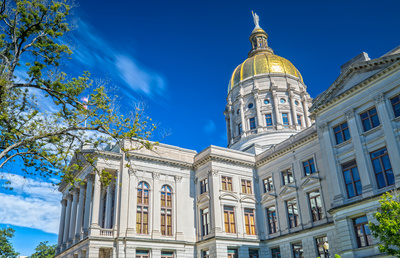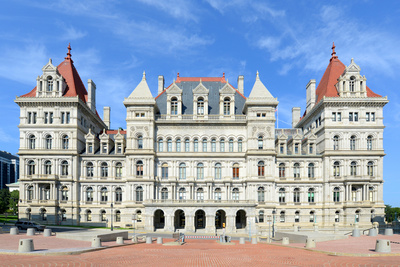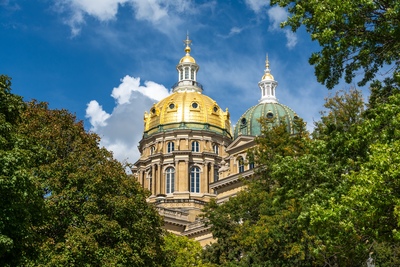One month into 2017 and state legislatures have wasted no time in proposing significant actions to affect their tax landscapes. Most states still have months of bargaining and debate to look forward to, but we are already getting indications about what the rest of the year's agenda could look like. Here are our reflections on what happened in tax policy last month.
(1) Governors roll out tax changes in their budget proposals
At the start of their legislative sessions, governors in several states have announced their intentions to effect significant tax reforms. These are the proposals that stood out to us.
- Alaska: Challenged by long-term revenue imbalances, Governor Bill Walker (I) has come out in favor of levying a new personal income tax paired with a restructuring of the sacrosanct Permanent Fund.
- Maine: Governor Paul LePage (R) floated a proposal to flatten the state's income tax by 2020 (he had previously suggested eliminating it altogether), expand the sales tax base to include a host of new services, and impose a educational tax surcharge on high-income residents.
- Massachusetts: Despite saying that he wanted to avoid broad-based tax changes, Governor Charlie Baker (R) has now proposed collecting sales tax on internet purchases, taxing short-term rental businesses (like AirBnB), requiring certain third-party payment processors to collect the sales tax on customer purchases (an idea that has never before been implemented in any state), and levying a new business fee to fund healthcare.
- Oklahoma: Faced with a $1.3 billion shortfall, Governor Mary Fallin (R) has broken with many in her party by seeking to bring in new revenues. The governor has proposed expanding the sales tax base to include services and increasing the cigarette tax.
- Washington: Governor Jay Inslee (D) proposed a hike to the state business and occupation tax, cuts to the property tax, and a new carbon tax, despite a similar environmental tax failing at the ballot last November.
The fact that these governors are recommending significant tax reform is no guarantee that legislators will pass them, but they do often set the terms of the debate that can dominate for the rest of the legislative session.
(2) Illinois Senate tries to break budget stalemate with compromise bill
In an effort to jump-start negotiations over Illinois' two-year budget impasse, a coalition of senators has banded together to hash out a budget compromise proposal that seeks to combine a set of Republican favored substantive governmental reforms (including pension and workers' compensation reform) with a series of revenue increases long sought by Democrats.
First proposed in the waning days of the state's 2016 legislative session, the deal has seen significant revisions in a short amount of time. The
initial offering proposed hiking the personal income tax rate to 4.95 percent and expanding gaming in the state. The package was
reintroduced at the start of this legislative session to include a 1-cent per ounce tax on sugary beverages (read more about the spread of sugary beverage taxes
here). It was then amended to replace the soda tax with a tax on select services (including automotive repairs and laundry services) and an “opportunity tax” based on a business' payroll.
Senators had hoped to begin voting on the proposal before the end of the month, but the bill's sponsors proved unable to whip sufficient votes and have opted to
delay further action until February 7 in hopes that more time will allow them time to gather additional support.
(3) States continue to move away from tangible personal property taxes
Lawmakers around the country and policymaker groups (such as the
National Conference of State Legislatures and the
American Legislative Exchange Council) increasingly understand that it's bad policy to tax business' tangible personal property (TPP), which generally includes machinery and equipment, and, in some states, business inventory. So far this year, 18 bills in nine states seek to limit or eliminate the tax. Efforts range from states seeking to establish new credits (South Carolina), expand existing exemptions (California, Colorado, Connecticut, and Maryland), and eliminating the tax entirely (Connecticut, Massachusetts, Missouri, Nebraska, and Texas). In the weeks to come we expect this list of bills to grow as more states begin the main part of their legislative work.
(4) Efforts to collect taxes due on remote/internet sales picking up steam
We've published a longer
article on this issue last week, but we have to note again the proliferation of state legislation seeking to expand state sales tax nexus standards to require collection by remote/internet sellers. In years past, states mostly pursued legislation that asserted nexus if businesses had in-state affiliates or agents, but this year the majority of states are following the South Dakota economic nexus model that establishes nexus through the value or volume of sales into the state. It is not uncommon for legislative ideas and language to spread from one state to another, but the speed of transmission we are seeing here is remarkable. With South Dakota's challenge to the country's sales tax nexus
steaming towards the U.S. Supreme Court, lawmakers in 17 states have now introduced 31 bills that would provide states greater authority to require remote and internet sellers to collect sales and use taxes.
(5) Oklahoma and Wyoming could make renewable energy more expensive
While we're continuing to see states implement or expand existing renewable energy tax incentives programs, lawmakers in Oklahoma and Wyoming have introduced legislation to remove credits for, or increase taxes on, renewable energy programs in their states.
In January, Oklahoma legislators introduced at least twenty-one bills dealing with tax credits for renewable and zero-emissions energy facilities, with topics ranging from capping the annual value of the tax credit, limiting the credits' applicable time frame, requiring greater disclosures from those receiving the credit, and discontinuing their refundability. States facing budget shortfalls often consider legislation limiting state tax incentives and expenditures (
Louisiana did so last year, for example) and Oklahoma's
$1.3 billion deficit is a cause of legislative concern, but the state's hard focus on the renewable energy industry is unique.
Wyoming went further this month, introducing a much publicized bill (
WY HB 127) seeking to increase the tax rate on wind energy produced in the state. The bill, which shares the policy goals of a failed proposal from
last year, would quintuple the per-megawatt hour tax on wind energy from $1 to $5. While this bill was killed in its first committee, in a related effort, Wyoming is considering a bill (
WY SF 71) that would exclude wind and solar from the state's energy production standard, effectively increasing the cost of energy from those sources by $10 per megawatt hour.



